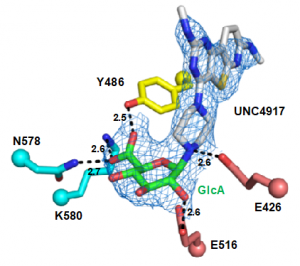Chemistry
Chemistry
Program Website: http://www.chem.unc.edu

BBSP Student Faculty Liaison: Dorothy Erie, PhD
Student Services Specialist: Jill Fallin
Program Overview
The Chemistry Department at UNC is ranked among the top fifteen graduate programs in the country and has outstanding research programs in all areas of modern chemistry. Areas of focus include understanding the molecular basis of biological processes and of human disease. Chemistry faculty lead one of the broadest networks of collaborative scholarship at UNC. Our graduate training program provides a collegial, interdisciplinary, and unifying home for students interested in research that lies at the interface of biology and the chemical sciences.
The overarching goal of the doctoral program is to train students broadly for leadership roles in academia and industry.
General Program of Study
The overall program is flexible in order to meet the diverse scientific goals of individual students. Requirements designed to prepare students for research are completed by the end of the second year. The Department is proud of its record of graduating the majority of its students within five years.
Year one: Class work, research-group rotations, teaching, selection of a research mentor.
Year two: Begin research , pass a written qualifying exam, and write and defend a Prospectus on the topic of your proposed doctoral research project.
Year three: Become intensively involved in research and present a seminar on your doctoral research project.
By year five: Publish, write a doctoral dissertation, and present a public defense of your research results.
Coursework
The Chemistry Department prides itself on providing flexible course options that allow students to pursue diverse scientific interests and to choose courses that best support students’ individual research goals. Students are encouraged to develop a course regiment in consultation with a faculty advisor with the goal of meeting the training needs of the individual student. In general, the Department emphasizes small enrollment didactic and literature-based courses. The department offers two graduate courses in Chemical Biology in the fall and spring, and encourages students to fill out their schedule with electives that meet their academic interests.
Fall:
CHEM 732: Advances in Macromolecular Structure and Function
Spring:
CHEM 730: Chemical Biology
Students are encouraged to choose electives of their choosing. Other options include, but are not limited to, elective coursework in organic, inorganic and physical chemistry, cell biology, enzymology, pharmaceutical chemistry, and computer science and bioinformatics.
Qualifying Exams
A written qualifying exam is typically held in early October of year two, with a second opportunity in January if needed. The exam is taken over a period of three days and will cover three current and advanced academic topics in chemical biology and biochemistry. The broad outline and background literature for these questions are provided one month prior to the exam to allow the students to prepare.
An oral and written Prospectus exam is completed by the end of the fourth semester and consists of a written (12 page) dissertation proposal and an oral examination. The student defends the proposal in front of a thesis committee of five professors. For the oral examination, students prepare a formal presentation of approximately 30 minutes. The committee evaluates the feasibility of the proposed work, the chemical and biochemical knowledge of the student, and whether the student has the skills to accomplish the dissertation work in a timely trajectory.
Chemistry Fall Graduate Courses
** CHEM 732 ADVANCES IN MACROMOLECULAR STRUCTURE AND FUNCTION: (3) Fall. In-depth analysis of the structure-function relationships that govern biological processes, including protein-protein and protein-nucleic acid interactions and enzyme function. Course includes selections from both the current and classic literature that highlight the broad range of techniques used to study these processes.
* CHEM 430 INTRODUCTION TO BIOLOGICAL CHEMISTRY: (3) Fall. The study of cellular processes including catalysts, metabolism, bioenergetics, and biochemical genetics. The structure and function of biological macromolecules involved in these processes will be emphasized.
* CHEM 431 MACROMOLECULAR STRUCTURE AND METABOLISM: (3) Fall. Structure of DNA and methods in biotechnology; DNA replication and repair; RNA structure, synthesis, localization and transcriptional reputation; protein structure/function, biosynthesis, modification, localization, and degradation.
Chemistry Spring Graduate Courses
** CHEM 730 CHEMICAL BIOLOGY: (3) Spring. Application of chemical principles and tools to study and manipulate biological systems; in-depth exploration of examples from the contemporary literature. Topics may change from year to year as the field of chemical biology is rapidly progressing. Example topics include new designs for the genetic code, drug design, chemical arrays, single molecule experiments, laboratory-based evolution, chemical sensors, and synthetic biology.
* CHEM 430 INTRODUCTION TO BIOLOGICAL CHEMISTRY: (3) Spring. The study of cellular processes including catalysts, metabolism, bioenergetics, and biochemical genetics. The structure and function of biological macromolecules involved in these processes will be emphasized.
* CHEM 432 METABOLIC CHEMISTRY & CELLULAR REGULATORY NETWORKS: (3) Spring. Biological membranes, membrane protein structure, transport phenomena; metabolic pathways, reaction themes, regulatory networks; metabolic transformations with carbohydrates, lipids, amino acids, and nucleotides; regulatory networks, signal transduction.
** Strongly recommended for BBSP students interested in Chemical Biology or Biochemistry
* Recommended for students who have not had significant prior coursework in Biochemistry
